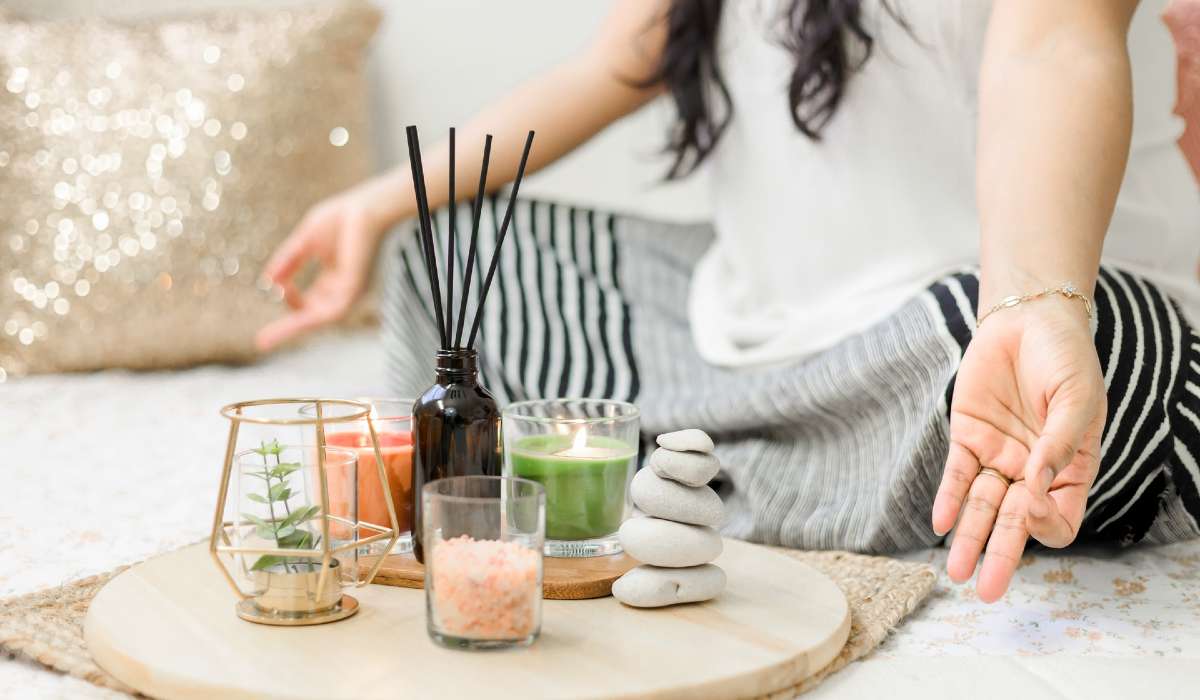
Is the fast-paced bustle of life making you feel exhausted or stressed? If so, then slow living is the solution for you. By simplifying your routine and slowing down, you’ll make those New Year’s resolutions easier to stick with and accomplish.
Here’s how you can practice slow living to achieve your New Year’s health goals:
- Take your time.
- Practice mindfulness.
- Cook from scratch.
- Turn off the screens.
- Declutter your space.
- Avoid an over-packed schedule.
- Get enough sleep.
- Enjoy the outdoors.
- Be comfortable with the quiet.
1. Take Your Time
As the name suggests, slow living means slowing down aspects of your everyday life. Whether that’s eating, talking to friends, or working out.
Doing so helps you find more enjoyment in what you do. And by extension, it keeps stress away and helps build confidence—which is excellent for your mental health.
Slow living is about the journey, not the destination. So, take your time and learn to take in the scenery instead of rushing into your next task.

2. Practice Mindfulness
Slow living and mindfulness go hand in hand. Both are about being in the moment and reducing feelings of unnecessary stress.
If you’ve never heard of mindfulness, you can think of it as a form of meditation. It’s about being intensely aware of your surroundings and how you’re feeling.
Practising mindfulness is an excellent way to clear your mind. Research indicates that it improves your mental well-being and helps you stick with healthy habits.
To try mindfulness:
- Find a quiet place where you can sit and relax.
- Set a timer for 20 minutes.
- Close your eyes, and try to clear your thoughts away.
- Focus on your breathing and immediate surroundings
- If your mind wanders, bring it back to the present. This is easier said than done, but try recognising any errant thoughts instead of denying them, this should help you to subsequently release them more effectively.
- Do this meditation twice daily and stay committed.
3. Cook from Scratch
It’s tempting to swing through a drive-thru when you’re feeling hungry. Especially after a long day of work, when that instant gratification is the easiest solution.
However, you should aim to cook meals at home and from scratch whenever possible.
Doing so can be enjoyable and teaches you to appreciate what goes into your food. And it’s immensely satisfying to eat something that took effort and time.
Not to mention that fast food is typically fatty and packed with carbs. So, cooking at home is also generally beneficial for your diet and health.
4. Turn Off the Screens
It can be tricky getting away from screens. After all, it seems like we need our smartphones for everything these days.
However, slow living teaches us that we can get more enjoyment from life when we pay attention to what’s around us. So, when you get home, try turning off all those TVs and putting the phone away.
You’ll be surprised how much more relaxed you feel without all that extra stimulus. Particularly if you’re getting constant texts and emails that keep you distracted.
Use that screen-free time to read a book. Or take your dog for a walk.

5. Declutter Your Space
Do you have a pile of clothes you need to sort through? Or boxes lying around that you need to break down?
Cleaning up your space is an excellent way to bolster your mental health. It’ll help you focus and feel accomplished – and you can bet dollars to doughnuts that’s the perfect mindset for sticking with those resolutions!
Doing so also makes it easier to relax. After all, your room or home won’t be as busy and cluttered with distractions. In fact, scientific evidence suggests that a cluttered space may significantly increase feelings of stress.
As the saying goes, “a clear space is a clear mind.”
6. Avoid an Over-packed Schedule
An over-packed schedule is a guaranteed ticket to worse health. Because not only will you be more stressed, but you won’t have time to exercise or enjoy life.
So, if you want to commit to slow living, trim the fat off your routine. Yes, counterintuitive as it may sound, less really can be more. A less hectic routine could be the key you need to keep on track with your goals.
Maybe you’ll have to skip that night at the pub. Or reply “no” to an RSVP.
Either way, keeping your schedule as simple as possible is beneficial for your well-being. It’ll give you more time to relax and unplug from the anxieties of life. And can provide space in the day reserved for working out.
Not to mention it’s hard to have fun even with friends if you’re already exhausted or stressed.
7. Get Enough Sleep
It’s common for people to skip out on sleep to fit more time in the day. But considering how important that rest is, that’s one of the worst things you can do for your health.
Slow living is about taking your time and getting the most out of what you do. And that includes sleeping.
Research shows that adequate sleep means better mental health, physical performance, and improved mood. So, when you cut back on how many hours you get, it takes quite a toll on your body and mind.

8. Enjoy the Outdoors
Slow living isn’t just about changing the pace of life. It’s also about appreciating the beauty and peacefulness of nature.
Spending more time outdoors is good for your health in a couple of ways.
For one, activities like hiking, climbing, and kayaking are all excellent forms of exercise. They’ll enhance your endurance, giving you the energy you need to seize the day.
Additionally, being in nature is beneficial for your mental health. It fosters a sense of tranquillity by helping us separate ourselves from the bustle of modern life.
If your New Year’s resolution is a better mind and body, then you can’t go wrong heading outdoors.
9. Be Comfortable with The Quiet
Stop for a second and listen. Try to pick out every sound you can distinguish.
Air conditioning, flickering light, TVs, phone notifications—the list can be endless.
It’s not often that we have quiet moments with all the technology and people buzzing around us. However, shutting off all those noisy distractions once in a while is good for you!
Try sitting on your back patio or deck, or just going for a walk, and enjoying the sounds of nature.
The calls of birds, the wind moving through the trees, and the chirping of crickets—hearing these things can bring a sense of calm. And because of that, lower your anxiety and improve your mental well-being.